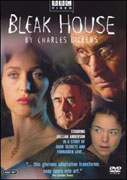Lawyers, Guns, and Money
We've gone DVD mad this fall at Olsson's, and I've been having a fine time revisiting old favorites well worthy of the home video library, in particular literary adaptations from British cinema and television.
Not that revisiting a fondly remembered series or film always produces the expected result. Most of you have likely had the experience of holding on to memories of a favorite TV series or movie, only to watch it again after the passage of years (and through more discerning eyes) and discover that the production values don't live up to your imagination. Bad sound, misconceived costumes, and performances that don't bear scrutiny have you cringing from the couch.
You can expect no such problems with the recent BBC literary adaptations, most of which are downright sumptuous. In the past decade or so, the novels of Dickens, Eliot, Trollope, and various Brontes have been brought to the small screen, handsomely, with excellent casts, in BBC productions. The art direction and period detail are stunning, the performances memorable, the entertainment quotient high.
Oh, I'm being coy about it all. These things are fun. They've got villains you love to hate, will-they-or-won't-they couples, and a lot of colorful characters uttering aphorisms in accents you can't quite place.
I've squirreled away a few of these recent BBC offerings, by coincidence lesser-known Dickensian works such as Martin Chuzzlewit, Our Mutual Friend, and Bleak House.
 Bleak House, the most recent of these, is almost eight hours of sprawling, engrossing Victorian entertainment of indefinable category. Is it a love story? A detective novel? A social treatise?
Bleak House, the most recent of these, is almost eight hours of sprawling, engrossing Victorian entertainment of indefinable category. Is it a love story? A detective novel? A social treatise?Well, this being Dickens, it is all those things and more. The story begins with a glimpse of the arcane and apparently brutal workings of the early 19th century British legal system, as yet unreformed and given to leaving victims in its wake.
Into this arena step three young people: Richard Carstone and Ada Clare, a pair of orphaned cousins preparing to wait out the interminable legal case that will determine their respective inheritances, and Esther Summerson, the dignified young woman who is to be Ada's companion while she and Richard take up residence with yet another cousin, John Jarndyce.
But if Richard and Ada stand on the brink of possible riches, it's the penniless Esther who proves to be the heart of the story. Her gentleness, intelligence, and warm heart draw admiration (and assorted would-be suitors), but it's the questions about her unknown parentage that eventually place her at the center of a power struggle that is linked to nearly every character in the drama.
At this point I should mention that when I said sprawling, I meant it. You're going to meet a lot of people, from aristocrats to the poster children for human misery. Bring on the lawyers, detectives, soldiers, loan sharks, urchins, 19th century activists!
Keeping track of the cast might require a wall chart, scorecard, or other device to keep everyone sorted. I'd propose admitting defeat and going straight to the Masterpiece Theatre website, specifically the link I've provided below, which not only identifies each character but the actor who plays him/her.
Don't let the list of names scare you off, however; half the fun is seeing the people who pass through Esther's life. Lots of familiar faces here: Pauline Collins as the batty but kind Miss Flite; Gillian Anderson, aloof and enigmatic as Lady Dedlock; Hugo Speer, a valiant and loyal Sergeant George; Nathaniel Parker, PBS's Inspector Lynley, as that houseguest from hell, Harold Skimpole.
Having a wonderful time menacing everyone else from inside and outside the courtroom are the crafty Ian Richardson, playing the lord chancellor, and Charles Dance, as Tulkinghorn, the sort of lawyer who could clear K Street with a single glance.
And speaking of menaces, get a load of Philip Davis's comic gem of a performance as the snarling money lender Smallweed, crippled but still able to torment people and cats ("Ye brimstone beast!") and put the squeeze on debtors. Anybody who saw him as the kindly husband in Vera Drake is in for a big surprise.
It's not just a field day for veteran actors, either; the young members of the cast deliver top-notch performances and have wonderful chemistry. Among the standouts are Anna Maxwell Martin, nicely underplaying as Esther, and Burn Gorman, who almost steals the show as Mr. Guppy, a lovesick law clerk with an enterprising streak.
So what else happens, aside from love and legal matters? It's not giving away too much to say that as in the Harry Potter books, a number of people end up quite dead, several of them dispatched under mysterious circumstances. That's where the lawyers and guns part comes in, and it's ample reason for the presence of Mr. Bucket (Alun Armstrong), one of the pioneering detectives of fiction, who eventually unravels the secrets of more than one pivotal character.
As is usual with Dickens, you can anticipate multiple love stories: in this case, two filled with promise and several almost unbearably poignant. There are moments late in the series when a character will surprise us all with sensitivity, selflessness, or a heartfelt expression of devotion. Be prepared for tears.
But mostly, be prepared for life, with all its moral ambiguity, unfairness, missed opportunities, and chances for redemption.




0 Comments:
Links to this post:
Create a Link
<< Home